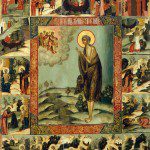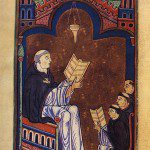![14th century butcher by unknown master (book scan) [Public domain], via Wikimedia Commons](https://wp-media.patheos.com/blogs/sites/637/2017/04/11-alimenticarni_ovineTaccuino_Sanitatis_Casanatense_4182-275x300.jpg)
A brother renounced the world and gave his goods to the poor, but he kept back a little for his personal expenses. He went to see Abba Anthony. When he told him this, the old man said to him, “If you want to be a monk, go into the village, buy some meat, cover your naked body with it and come here like that.” The brother did so, and the dogs and birds tore at his flesh. When he came back the old man asked him whether he had followed his advice. He showed him his wounded body, and Saint Anthony said, “Those who renounce the world but want to keep something for themselves are torn in this way by the demons who make war on them.”[1]
There are two ways this story can be engaged.
The first is to see what it says to those called to the religious life. The other is to see how the wisdom of monastic life can be adapted to those not called to such a radical way of life.
The monastic vocation is one of detachment. The would-be ascetic must give up all they have and then rely upon God for their personal well-being. Monasticism is radical. It is a vocation for a few. Those who are called to that way of life have as exemplars great ascetics like Elijah and John the Baptist. Scripture shows us how Elijah and John lived out their faith in God through radical abandonment of the all earthly cares. Those who follow after such great spiritual leaders will gain a radical sense of freedom as the world and all its pulls are abandoned, but in order for that freedom to be found, the would-be ascetic must truly cut themselves from all attachments to the world. They have to put their complete and utter trust in providence, and accept what happens to them, good or bad, will be for their own spiritual purification and glorification. They are called out of the world, not to denounce the world, but to serve God and God alone, giving no more heed to ordinary societal obligations. In serving God, they will also serve the world, because there is no service to God without service to the rest of humanity. They will engage the world and bless it through prophetic mediation; because they have died to the world, the ordinary expectations of the world will not constrain them from what they have to say. They will find themselves free to speak to others about the will of God. They will be able to denounce whatever evils the society they came from promotes because they will find themselves outside of the domain of that society and they will be able to see it for the good and for the evil within it.
For the monk, the liberty they have achieved, the freedom which puts them outside of the normal confines of society, is of course dependent upon their voluntary renunciation of the ordinary way of life. They have to renounce all associations to the world, including, and especially, their possessions, if they want to be free from any undue attachment to the world. Only in this manner will the world find nothing left to control them, as Evargius suggested to Eulogios:
The person without possessions enjoys the pleasure of a life free from cares, but the one attached to possessions has the distress of the rich person as his constant concern. When you do not give your heart to considerations of material things, at that moment you may drive away captive the crowd of thought. When you deny the desire of acquisitiveness, at that moment you will bear also the cross without distraction. But the thought of material things will forebode for you old age, famines, and sicknesses in order to dive your hope in God among financial concerns. Let him who has chosen to practice the ascesis of renunciation make for himself a wall of faith, a fortification of hope, and a secure grounding in love.[2]
Anthony met up with a monk who, to be sure, did some good by selling off most of what he possessed and living what he had earned to the poor. But Anthony knew that the monk had yet to truly take on the ascetic life in faith, as can be seen in the fact he did not give away all that he had, but still possessed a little from his worldly wealth which he planned to use to keep himself secure in his monastic vocation.
The monk was double-minded; he desired a good thing, and did much good, but he kept an attachment to earthly cares and concerns. Anthony understood that the monk would be divided within himself, and utterly destroyed from within, if he continued as he was doing because the monk had yet to take the final, radical step of detachment needed for authentic asceticism. That part of him which remained afraid, remained unfaithful to God, and so he was not living out his monastic calling with fidelity but rather, with a half-hearted acceptance, willing to follow it so long as it seemed to provide him the pleasant experiences he desires. The monk continued to have a foot in the world, even as he tried to have one in the desert city of the saintly ascetics. In this fashion, he was found serving two masters, God and mammon, and Anthony knew what Jesus had said of that: “No one can serve two masters; for either he will hate the one and love the other, or he will be devoted to the one and despise the other. You cannot serve God and mammon” (Matt. 6:24 RSV).












